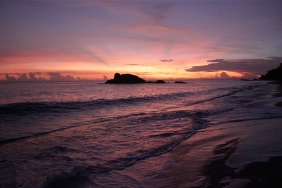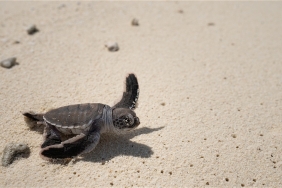SHARPEN YOUR BRAIN BEFORE JUMPING INTO THE SEA!
By: Siti Yasmina Enita
After a long preparation for the 2018 Kei Expedition. The day finally came when I met the entire Kei expedition team at the Kei Expedition opening and workshop (19/10) at the WWF-Indonesia office in Langgur, Southeast Maluku. The panda logo greeted us at the gate, Langgur's 'green office' has a large courtyard. "Sometimes in the afternoon we play badminton in the courtyard," said Andreas Hero Ohoiulun, who is familiarly called Bang Hero, Project Leader of WWF-Indonesia's Inner Banda Arc Sub-Seascape.
The Kei expedition team this time was also enlivened by seven students from the Fisheries Diving Club of Bogor Agricultural University (FDC IPB), a blogger and videographer @worldlifetravel Mas Bima, and Om Ongky from the Southeast Maluku Fisheries Service. This Kei expedition also collaborated with the Directorate General of Marine Resources and Fisheries Monitoring (PSDKP) of Southeast Maluku, the Indonesian Institute of Sciences (LIPI), the Southeast Maluku Regency Government and Maluku Province.< br />
The warmth of the workshop was also complemented by remarks from the Head of the Environment Agency - Ir. Alexander Joko Wiyono, Representative of the Research and Development Agency - Mrs. Ola, Head of the Southeast Maluku Regency Fisheries Service - Mr. Iwan and representatives from the Gugus Eight Provincial Office. In their remarks, each institution shared information on the condition of Kei Island waters, from social, economic, fisheries to the current condition of tourism on Kei Island.< br />
"Now is the time for us to see what happened for 3 years in the waters of Kei Kecil after taking data on coral reef health in 2015. Both good and bad, let's make it a lesson and evaluation material for management for the next area, "explained Bang Hero.
During the workshop, the expedition team's knowledge was also sharpened, especially about data collection of fish, benthic and seagrass. Although I am a documentary team, the material and fish and coral tests during the workshop must be followed by all team members. The material presented was the concept of analyzing the impact of conservation area management, methods of collecting data on coral reef health, coral structure (rugosity), seagrass data and documentation guidelines during expedition activities.
Fish and coral test took place six times during the workshop. The Marine Science team also provided an online test that everyone could use. This is one of the steps to reduce the use of paper. So when the test began, the room was silent and everyone was focused on staring at their cellphone screens until Bang Iki's "Yaa, time's up!" broke the silence.
The most exciting material for me was the fish estimation material, because it tested the accuracy of our eye estimation to measure the length of the fish. From the normal position of the fish image to upside down, from using my fingers for estimation to finally learning to trust visual estimation.





